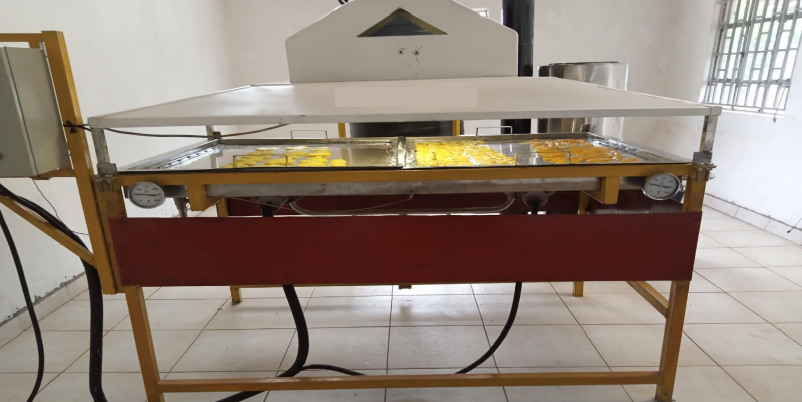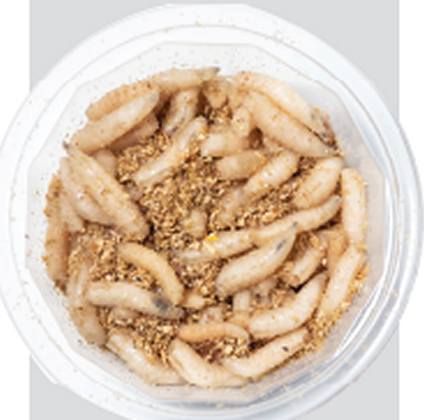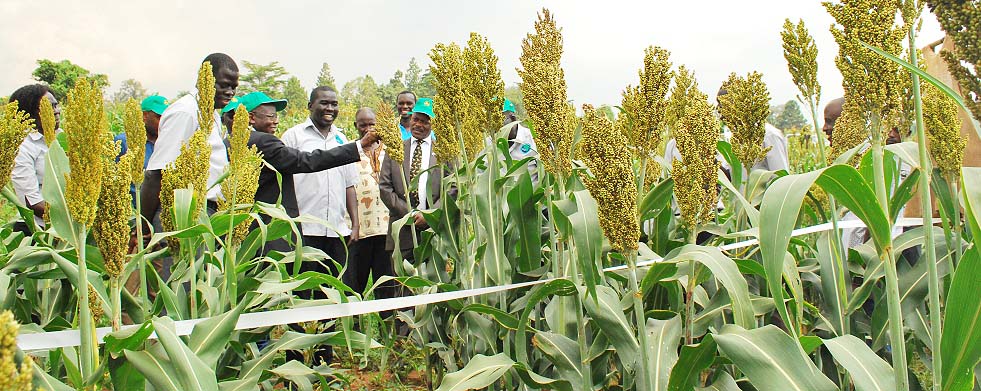CAES continues to undertake basic, strategic and applied research and development in the broader areas of agriculture, food technology and nutrition, forest management and environment and natural resources management. Focus has mainly been on enhancing farmer-centered approaches, climatesmart agricultural systems, value chain improvement for the achievement of food and nutritional security, livelihood improvement and overall rural development.
The college has also pioneered Research and Development (R&D) in biotechnology, integrated pest and disease management, linking producers to markets as well as incubation of innovation for market products as well as informing policy with respect to climate change, disaster risk management and environmental management.
KEY RESEARCH AND INNOVATIONS
The key research innovations generated at CAES that can support government programmes, such as the Parish Development Model (PDM), aimed that transforming societies include;
- Makerere University Soil Test Kit can provide rapid soil assessment which can inform soil requirements to improve soil management, crop yields and incomes for farmers.
- Disease, pest and climate stress tolerant cow peas, and sorghum under the Makerere University Regional Centre for Crop improvement (MaRCCI).
- Drought, disease and high yielding varieties with short maturity periods Mak Soybeans = Maksoy 1N, Maksoy 2N, Maksoy 3N and Namsoy 4M 4Nand 5N and 6N providing an affordable source of protein under the Makerere University Centre for Soybean Improvement and Development (MAKCSID) crop breeding programmes.
- The bio-fertilizer formulations to unlock crop productivity for improved food security.
- Production and promotion of protocols for Banana Tissue Culture for quick multiplication and disease control to improve yields.
- Value addition on Sweet Potato-Sorghum enterprises for improved livelihoods in Uganda.
- Pig artificial insemination and elite genetics to improve farmers’ income.
- Provides alternative source of protein for poultry and fish feeds through rearing blue flies, maggots, and earthworms to supplement silver fish.
- Produced a livestock milk booster from sugarcane industrial wastes to mitigate malnutrition, extreme hunger and poverty through improved milk production, nutrition and improved daily cash flow among farmers.
- Promotion and utilisation of the mobile fruit factory for juice extraction and value addition.
- Developed a three-wheeled multipurpose farmers’ tractor, MV Mulimi- Able to thresh maize, pump water from a depth of 7m to a height of 33m, plough gardens, transport 20 adults and their goods over a reasonable distance, as well as charge a mobile phone.
- Automated the Communal Hand Water Pumps to Eliminate COVID-19 Transmission (Mak-Nayi).
- Green Low-Cost Touch-less Hand wash Technology (TW-20 Kit) for public shared spaces.
- Refractance Window Drying Technology (RWDT) for production of high-quality bio-products. Adapted to common fruits, vegetables and herbs, for example mangoes, pineapple, jackfruit, carrots and moringa.
- Designed and developed an automated spray drier for egg powder production for use in bakery industries of Uganda.
- Testing the KeBERA ICT based solution to detect inorganic contaminants as well as mycotoxins in food.
- Students have been involved in the production of yogurts, value addition to produce snacks from sweet potatoes, bananas and sorghum etc.
- Established a Botanical Garden covering 30 acres at MUARIK. This is one of the College initiatives geared towards the protection, conservation and recreation of ecosystems. The gardens are also used for teaching and research.
- Introduced 24 new sweet potato varieties on the Ugandan Market.
- To improving health service delivery in remote areas of Africa through provision of electricity to health facilities, preservation of medicine, water purification and improvement of hospital room temperatures in remote areas under the Sustainable Off-grid solutions for Pharmacies and Hospitals in Africa (SophiA). Project. .
- Enable implementation of selective breeding of the Black Solder Fly (BSF) for improved livestock feed availability in Kenya and Uganda by generating new knowledge of insect genetics, genomics and phenomics under the FLYGene Project –in partnership with AARHUS University, ICIPE, University of Nairobi, and Marula Proteen Limited, funded by the Danish Ministry of Foreign Affairs.
- Developed a solar-powered cooker – The MakSol Cooker that will greatly increase access to modern zero-emission cooking for off-grid communities. With a battery life of 5 years and 20 years for the solar panels, the cooker comes with seven unique benefits; zero emissions, zero recurring cooking costs, clean cooking, minimal fire outbreak, easy to clean, minimal heat loss to the surrounding and a cool kitchen.
- Promoting consumption of Amaranth (dodo porridge and vegetables) in schools for nutritional security.
- Developed Nutrient-Dense Recipes and Products from Underutilized Crops to Alleviate Malnutrition among HIV/AIDS Infected Persons
- Strengthening the resilience and visibility of peri-urban poultry farmers in Wakiso for better marketing and profitability through feeding, post-harvest handling, value addition and resources recovery.
- Developed a Safe and Efficacious Anti-malarial drug from Traditional medicine.
- CAES is also taking lead in promoting climate smart agriculture as a measure to boost food security.

The Refractance Window Drying Technology (RWDT) is used in production of high quality bio-products- Adapted to common fruits, vegetables and herbs, for example mangoes, pineapple, jackfruit, carrots and moringa.

Makerere University, College of Agricultural and Enviromental Sciences (CAES) also Released six drought, disease and high yielding varieties with short maturity periods Mak Soybeans = Maksoy 1N, Maksoy 2N, Maksoy 3N and Namsoy 4M 4Nand 5N and 6N providing an affordable source of protein under the Soybean Improvement and Development (MakCSID) crop breeding programmes.

Makerere University Soil Test Kit can provide rapid soil assessment which can inform soil
requirements to improve soil management, crop yields and incomes for farmers.

The Organic Fertilizer was initiated as a way of Providing an alternative source of protein for poultry and fish feeds through rearing blue flies, maggots and earthworms to supplement silver fish.

The College also released disease, pest and climate stress tolerant cow peas, and sorghum under the Makerere University Regional Centre for Crop improvement (MaRCCI), as model crops to demonstrate best-breeding practices to both students in the PhD and MSc training programmes of MaRCCI as well as scientists in the region.

